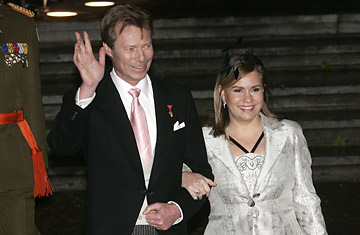
Archduke Henri and Archduchess Maria-Teresa of Luxembourg
The 20th century was not good to Europe's once mighty kings and queens. Old World royals lost most of their monarchical mojo, with their powers now limited to the purely ceremonial, as in Sweden, or to such roles as the Spanish King's command of his country's armed forces. The last absolute monarch left on European soil is Pope Benedict XVI.
Like most of his 20th century predecessors, Duke Henri of Luxembourg has played a mostly figurehead role in his country, a sliver of a nation wedged between Germany, Belgium, and France. But an unfolding royal family drama — replete with a papal cameo — has forced the handsome 53-year-old Duke to fall on what remains of his political sword. (Read TIME's Top 10 news stories of 2008.)
Duke Henri refused to sign a bill to legalize euthanasia for the terminally ill. The proposal, which would make Luxembourg one of the few countries to give terminal patients the right to die, was approved earlier this year by Parliament. But the monarch, a devout Catholic, says "reasons of conscience" prevented him from making it law. (Read about the fight to legalize euthanasia in the U.S..)
The Duke's stance is a strong nod to the current Pope, who has made the struggle against the secularization and "de-Christianization" of Europe amongst the central tenants of his papacy. Unlike the Pope, though, the Luxembourg monarch must face the realities of democracy. Aware that it would be the first time since 1912 that a Duke or Duchess of Luxembourg has defied the will of the elected government, Henri called on Parliament to change the Constitution to strip him of the power to approve laws. On Thursday, the Luxembourg Parliament voted overwhelmingly to approve the measure, which will become law on a second reading in the coming days. In the future, the reigning Duke or Duchess will only sign decrees to officially publish or "promulgate" pre-approved laws.
Since the Duke's annuncement, throne-watchers in Luxembourg have wondered why their head of state would take such a rigid stand on principle. Some speculate that the religious hardline is driven by the Grand Duchess Maria Teresa, Henri's wife and the mother of his five children. The Cuban-born daughter of Spanish aristocrats, the Grand Duchess has made her staunchly traditional Catholicism evident, and is believed to be very influential in her husband's public decisions.
The last time a Luxembourg royal refused to sign a bill into law was the Grand Duchess Marie-Adelaide, who opposed a measure to limit religious instruction in primary schools. Seven years later, after questionable decisions during World War I, she was forced to abdicate the throne to her younger sister.
Henri wants to avoid popular dissent around his reign, which may help explain his decision to cede political authority in order to hold on to the Duke's role as symbol of national unity. Michel Pauly, a professor of transnational Luxembourg history at the University of Luxembourg, says stripping the Duke of any legislative authority is the "natural democratic evolution" of the country, and predicts that Luxembourg will eventually go down the path of the purely ceremonial monarchy in place in countries such as Sweden and Denmark.
More importantly, Pauly says, is Henri's ongoing trouble with "public relations," since taking over from his well-liked father in October 2000, including his attempt to sell the family's forests to the state for a massive profit. "Henri doesn't have full popular legitimacy," says Pauly. "He has to find a new way to legitimate his role." Achieving such broad consent may not be helped by a hard line on bioethics in a country where fewer than 10 percent still attend church regularly. Getting out of the way, however, may just do the trick.
